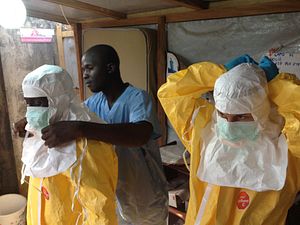The on-going Ebola outbreak in West Africa, now up to 17,145 reported cases and 6,070 reported deaths, captured attention all over the world as the disease outpaced global prevention and treatment efforts. Much attention has been paid to Beijing’s response to the outbreak — including here at The Diplomat — but Taiwan’s own efforts to join the global fight against Ebola has gone relatively overlooked. In part, this is because Taiwan’s participation is limited — not by choice, but by continuing restrictions on its engagement with international organizations at Beijing’s insistence.
Last week, Taiwan gave the U.S. Centers for Disease Control and Prevention (CDC) a $1 million donation “to help meet the most urgent, on-the-ground needs in West Africa.” The donation will go to the CDC’s Global Disaster Response Fund, which provides materials from protective gear to vehicles used to provided transportation for medical workers. In addition, Taiwan has donated protective gear — 100,000 coveralls and 100,000 surgical masks — for U.S. personnel working on the ground in West Africa. Lyushun Shen, Taiwan’s representative in the U.S., placed the donation in the context of Taiwan’s broader support for humanitarian relief. “Taiwan has been committed to the role of a provider of international humanitarian aid, so it is important for us to support the ongoing international efforts in the fight against Ebola,” Representative Shen said.
According to Steve Kuo, the director-general of Taiwan’s Centers for Disease Control, Taiwan is also exploring how to send its own medical personnel to join international efforts, either by collaborating with U.S. and Nigerian partners or through Doctors Without Borders. Taiwan’s CDC sent two doctors to Nigeria in August, but their mission was “to ensure the health and safety of the more than 80 Taiwanese businessmen and dependents residing in Nigeria” rather than joining broader efforts to prevent the spread of the disease.
Taiwan’s involvement in the fight against Ebola demonstrates an underlying reality: Taipei is often forced to channel its humanitarian relief efforts through third-party partners (such as the U.S. or Nigeria). This is because Taiwan itself has only limited access to international bodies that handle humanitarian aid, due to Beijing’s protests regarding Taiwan’s inclusion in international organizations.
After years of diplomatic efforts, Taiwan was admitted to the World Health Assembly as an observer in 2009, finally providing Taiwan access to WHO information on the outbreak and global response measures. Despite this breakthrough, there are concerns that Taiwan’s status is still not official and is contingent on annual invitations — which could be blocked at any time by Beijing. As Bonnie Glaser of the Center for Strategic and International Studies noted in a recent report, “Taipei’s ability to engage in various WHO working groups and technical activities remains limited.” In particular, Glaser notes that Taiwan is not included in the WHO’s Global Outbreak Alert and Response Network, which limits both the WHO’s ability to respond to crises within Taiwan and Taiwan’s ability to join international humanitarian efforts.
Even more troubling, a secretive 2005 memorandum between the WHO and the mainland reportedly required that all WHO contacts with Taiwan first pass through Beijing. According to an April 2014 U.S. State Department report, the WHO continues to seek Beijing’s approval on messages ultimately meant for Taiwan, resulting in delays and restrictions on Taiwan’s participation in WHO initiatives. Taiwan has had difficulties having its participation in WHO activities approved. At times, this extends to financial aid as well – a $5 million donation from Taiwan for a recent WHO flu vaccination program was turned down.
Restrictions on Taiwan’s participation in the WHO are never more clear than during times of crisis, such as the current Ebola outbreak. Given the constraints on its engagement with the WHO, Taipei must find more creative ways to support global humanitarian efforts – often by working in conjunction with the United States. In addition to the recent $1 million donation to the U.S. CDC, Taiwan previously cooperated with the U.S. to respond to large-scale humanitarian disasters in the Philippines in 2013 and Haiti in 2010.

































